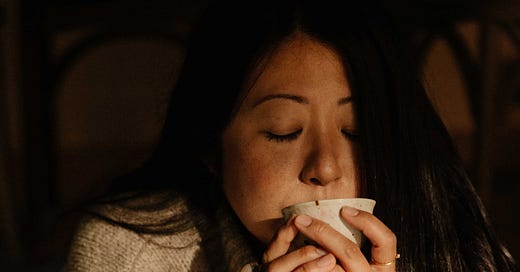HOW DOES BEING TEA DRUNK FEEL?
Can tea truly induce a sense of being 'drunk'? In Chinese culture, being 'drunk' is a poetic expression denoting an immersion in passion, whether it's being intoxicated by the night's stars, by the ecstatic experience of live music, or something equally consuming.
Yet, there are indeed psychoactive effects experienced when partaking in tea, offering a mildly altered state. Here are a few states that we’ve noticed throughout our Magick of Teas with @o5tea :
* Lightened, as if about to take flight.
* Creative.
* Intuitively and psychically heightened.
* Responsive to playful impulses.
* Introspective and emotionally attuned.
* Uplifted, happy, giddy, activated.
* Insightful.
* Philosophic.
* Feeling a profound connection with yourself and all around.
* Relaxed and serene.
This 'tea drunk' effect can result from a combination of factors, varying from person to person, and types of tea.
While caffeine is often present in teas derived from the Camellia sinensis plant, and while caffeine does stimulate and energize, the tea drunk experience is more attributed to another compound found in tea: theanine. This amino acid is known for its calming effect on our nerves, promoting relaxation. Theanine positively affects brain chemistry by increasing GABA production, serotonin, and dopamine levels. When combined with caffeine, this results in a blissful, elevated sensation. Theanine enhances alpha brain wave activity, instilling a clear mind and meditative and other esoteric experiences. The polyphenols in tea catechin can lower blood glucose. In some individuals, and from varying levels of catechins among teas, these polyphenols may cause a sense of lightness and a buzz.
From spiritual and energetic perspectives, being tea drunk is often associated with being over-filled with Cha Qi, the life force of the plant or the plant’s spirit. When channeling 'cha qi' in both body and spirit, I've observed it to be highly suitable for creative and intuitive work. For me personally, the sensation of Cha Qi is most experienced when I am sitting with Pu’er Tea and Oolong Tea, perhaps because these varieties of tea are often harvested from old growth arbors and ancient tea trees or bushes with deep roots grown in remote high mountain regions. Pu’er and Oolong tea varieties have more endurance, meaning you can brew many infusions from the same leaves, where each steeping presents a different experience and tea story. The time we spend with the tea through the many infusions creates a direct link or bond, which can aid in reaching a meditative or connected state. In this connected state, one can perceive how the tea makes them feel in a more powerful way as the energy flows, builds and resonates. In contrast to alcohol, tea does not impair motor skills, influence decision-making, or result in forgetfulness or hangovers. The "tea drunk" feeling is considerably gentler, more subtle, and more spiritual by nature.
As intuitives, witches, and spirit workers can relate with Tea as much more than just beverages, and instead, as living portals to connect with the Unseen. On Saturday, November 18's Magick of Tea: A Sensorial Journey, where we'll be working with a selection of teas from O5 Tea (Kitsilano) to embrace mystery and surprise beyond just taste – encompassing all your senses and intuition. Through tea and beyond-tea exercises that attune us to greater psychic senses, this mirrors the essence of late fall, where nature’s subtle artistry thrives within hidden shadows.
Spot available for both in-person and live-stream. Details and tickets available via the button below.




